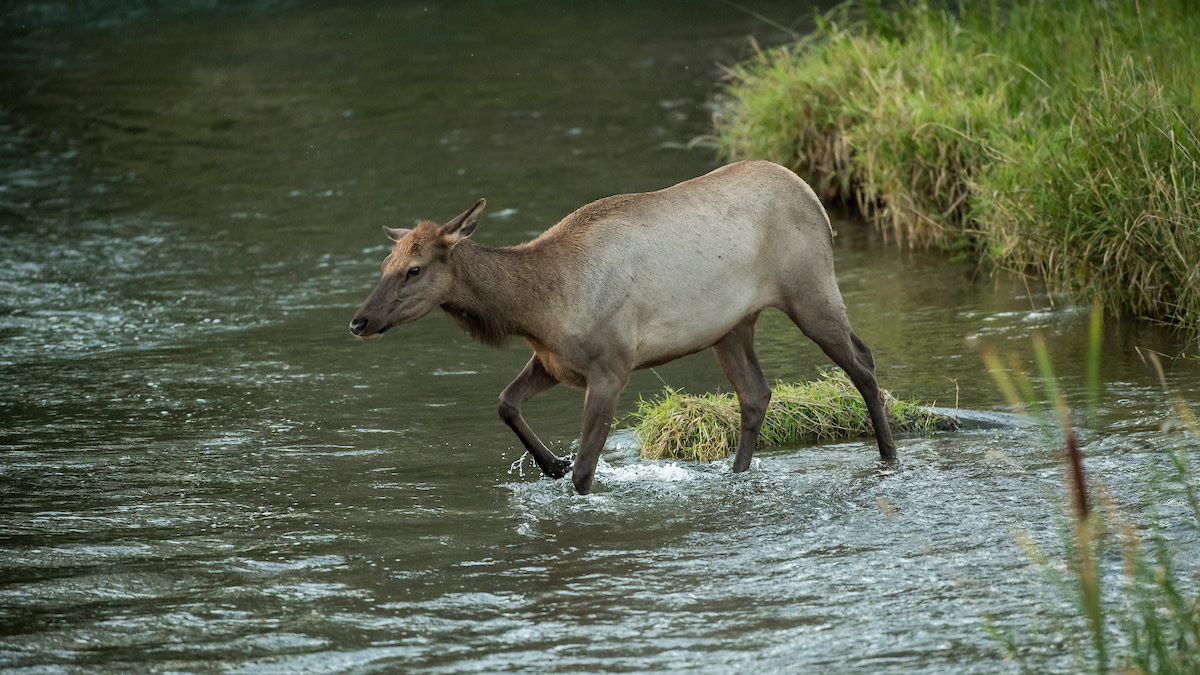
An elk hunt turned ugly for a group of Minnesotans on a first-time outing near Jackson, Wyoming, on Sunday, Sept. 26.
Seventy-nine-year-old Bob Geringer and two unnamed hunting companions shot three cow elk and one calf around 9 a.m. as the animals congregated on an island in the Snake River. They held enough tags for all the animals. But soon after their combined seven rounds felled the elk, the elderly hunters realized the gravity of their predicament.
“It turned out to be a friggin’ nightmare,” an apologetic and somber Geringer told the Jackson Hole News and Guide. “We didn’t realize the river was quite the way it was, and it happened fast.”
With the current running high, the elderly Geringer and his hunting party were effectively barred from retrieving their meat. To make matters worse, the spot from which they'd shot the elk—a popular recreation area along the Snake River known as Emily's Pond Levee—was beginning to fill up with Sunday recreators who'd never anticipated the scene they were about to encounter.
Paralyzed by their inability to safely ford the swollen Snake and their lack of a suitable watercraft with which to execute a pack-out, the Minnesotans remained on the levee well into the early afternoon as predictable and heated confrontations with the public began to ensue.
All the while, the elk they'd legally shot lay warming in the midday sun.
Eventually, WGFD Game Warden Jon Stephens, whose territory covers much of the eastern bank of the Snake River and stretches north through the Teton Wilderness to the southern boundary of Yellowstone National Park, arrived on the scene. He was responding to about a dozen phone calls from alarmed citizens who’d seen the dead elk as they strolled the levee and suspected illegal activity.
“I kinda laid into those guys. I was a little worked up about the eyesore they created,” Stephens told MeatEater about his interaction with the Minnesotans.
"In my opinion, these guys made a terrible judgment call," Stephens said. "If I can place any fault on them it is for not having a complete game plan in place for retrieving the animals. They completely underestimated the swiftness and depth of the river channel, and assumed that they would easily be able to wade it when in fact they were completely unable to do so."
But a stern talking-to proved to be the extent of Stephens’ reprimand for the ill-prepared hunters, as they hadn’t technically violated any game laws.
“What these hunters did was not illegal,” said Sara DiRienzo, a public information officer with Wyoming Game and Fish Department, “But it comes down to a basic understanding of hunting ethics. Just because something is legal doesn’t make it the right thing to do. As hunters, we rely on public acceptance, and in order to receive that acceptance we all need to maintain high ethical standards.”
By the time Stephens arrived, Geringer and his hunting partners had the beginnings of a plan in place. They intended to retrieve their substantial haul of elk meat using a canoe borrowed from a local. They were able to cross the channel to the island in the canoe, but capsized the vessel on the return and temporarily lost it to the river.
At this point, Stephens had seen enough. He ordered the hunters to at least field dress all the elk before coming up with an alternate plan to get them out of the levee area.
Around 6 p.m. the next day, more than 30 hours after their initial shots rang out from the levee, the Minnesotans returned by water. This time they were accompanied by a local raft guide whom they’d hired to help them float to the island, then float the meat down to a boat ramp in nearby Wilson.
Mark Gocke, public information specialist at WGFD, told MeatEater that he was unaware of any substantial meat spoilage or predator loss to the elk carcasses, and the hunters did remain within the 48-hour requirement for extracting downed animals.
"The bottom line is that this was legal on all fronts, but the hunters regretted shooting those elk once they'd done it," Gocke said. "People have hunted that area before and have done fine, but we don't necessarily recommend it because it can be difficult logistically. These guys did not have a plan in place to get their meat out, and it wasn't a good look. It seems like they got caught up in the moment and then realized they were in a real predicament."
Gocke hopes that, at the very least, other hunters observe the mistakes that occurred: "There are lessons to be learned here. Hunting, especially with an animal like an elk, is a major logistical operation, and you must have a plan in place for retrieving your meat before you ever head out into the field. There is a legal as well as an ethical obligation to make that happen. These guys should have scouted this area better beforehand and been better prepared before they ever pulled the trigger. It wasn't a good decision."
Geringer later told the Jackson Hole News and Guide that, given a second chance, he and his partners would have passed on their Snake River elk.
“It’s just that the timing was wrong,” he said. “If we had to do it again, there’s no way in the world any of us would have done that. It just happened.”
Feature image via John Hafner.






Conversation